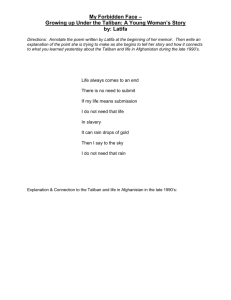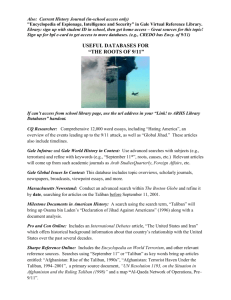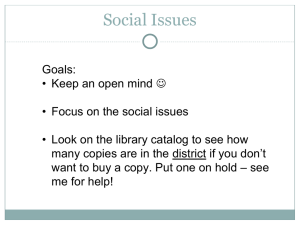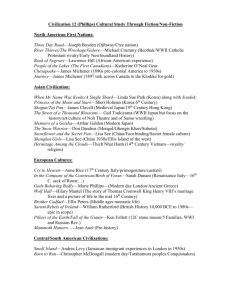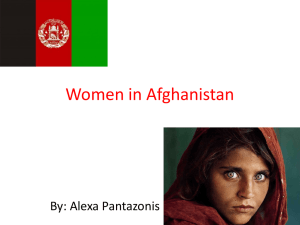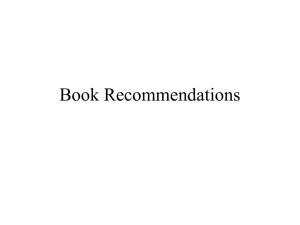Oppression of Women in the Middle East
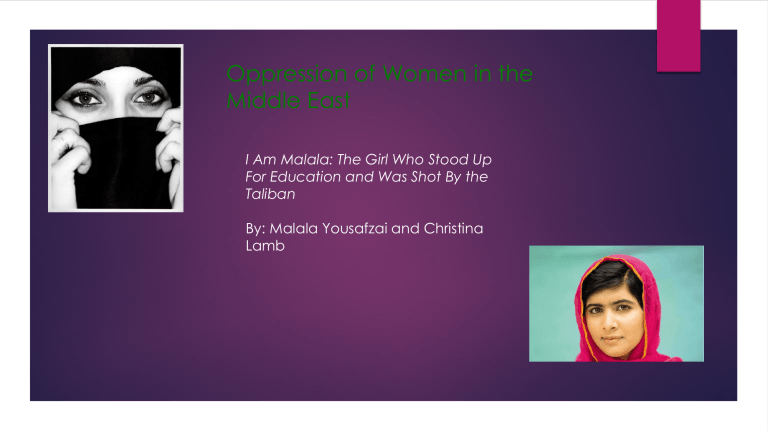
Oppression of Women in the
Middle East
I Am Malala: The Girl Who Stood Up
For Education and Was Shot By the
Taliban
By: Malala Yousafzai and Christina
Lamb
Why does gender stratification still exist in many Middle Eastern
Societies and how are women rising above this adversity?
In Bangladesh, Muslim fanatics throw acid in the faces of unveiled women
Accounts of lashings, stonings, and honor killings are regularly in the news
"They would hit us and spit on us, and then we would have to come in to the hospital to do our work."
Why does gender inequality exist?
Men claim that Islam states they are superior to women
Many male scholars have interpreted the Qur’an in ways that limit the rights of women
For Example: The Qur’an states that “Woman must lower their gaze and be modest”, many males have over analyzed this and have in some areas have required women to wear burqas which significantly reduces their rights to choose what they want to wear
This Claim has been proven wrong because………
Islam is a religion that respects women and humanity
The Qur’an required that women have a say in their marriage, gave them the ability to inherit property and granted them the right to initiate divorces
The Qur’an does not state any where that women should be secluded in their homes
One of Muhammad’s wives, A’isha was a scholar of many subjects and was an influential teacher
The Taliban
The Taliban’s version of Islam is not supported by the world’s view of Islam
The Taliban regime has cruelly reduced women and girls to poverty, worsened their health, and deprived them of their right to an education
The Taliban closed down the women’s university and have forced nearly all women to quit their jobs
Life for women Under the Taliban
The UN has estimated that only 7% of girls in Afghanistan attend school
The life expectancy of a widow under the Taliban regime is 44 years old
Afghanistan has one of the highest rates of infant mortality, 165 of every
1000 die before their first birthdays
Quotes
Quotes from women who have been oppressed
"When we are together, everyone here is talking about how the Taliban has destroyed our lives.
They won't let us go to school because they want us to be illiterate like them."--Nasima, 35-year-old
Kabul resident
"Because of the Taliban, Afghanistan has become a jail for women. We haven't got any human rights. We haven't the right to go outside, to go to work, to look after our children."--Faranos
Nazir, 34-year-old woman in Kabul
Quotes from the Taliban’s perspective
"If a woman wants to work away from her home and with men, then that is not allowed by our religion and our culture. If we force them to do this they may want to commit suicide."--Mullah
Nooruddin Turabi, Taliban Minister of Justice
"We have enough problems with the education of men, and in those affairs no one asks us about that."--Qari Mullah Din
Muhammad Hanif, Taliban Minister of Higher
Education
Rules that the Taliban has for women
Women are not allowed to:
• Speak or laugh loudly
• Ride bicycles or motorcycles
• Show their ankles
• Wear shoes that click or wear makeup
• Leave home unaccompanied
• Attend school
• Speak to men who are not close relatives
• Work
How are women rising above this adversity?
Spreading Education
Many people are doing whatever they can to educate young women in the Middle East even if it means defying the law http://www.takepart.com/article/2012/10/02/dr-yacoobi-afghan-institutelearning
Protest
Yemeni women burned their veils to protest their inability to vote
Women in Saudi Arabia protested for their right to drive
Forming Groups
The Feminist Majority Foundation has been fighting the mistreatment of
Muslim women for years
They have created a campaign complete with rallies, petitions, and fundraisers
Many women have organized movements in countries such as Iran,
Lebanon, and Egypt. Women in Middle Eastern Nations such as turkey,
Morocco and Tunisia already enjoy almost western levels of freedom
One of their central projects is progressive religious reform which prevents the practices of veiling, arranged marriages and a restriction of what they can wear
Using the Written Word
Women have been writing memoirs to express the unfair treatment of women in their homelands. The written word has become a powerful tool for women because it has allowed them to make the global community aware of the gender inequality that exists in their world. It gives them a vehicle to escape the terrible conditions they have faced in their homeland without the consequences of persecution. Malala uses her memoir as an avenue to continue her drive for women’s education.
Speaking out
https://www.youtube.com/watch?v=UrasFcGqM_s
Malala speaking to the UN about how she continued to advocate for her education despite being threatened by the Taliban
In Conclusion
Although the Taliban and conservative religious groups have been degrading women and denying them basic rights such as education, women have been boldly defying them in a variety of different ways. They have been using their voices to speak out against oppression, they have organized protests, and documented their experiences in powerful memoirs. Middle Eastern women have been active letting the global community know that something has to be done about this issue
Bibliography
Asfour, Nana. “Women Under the Influence.” BookForum Apr. 2008: 12. SIRS Issues Researcher. Web. 11 Nov. 2013
Esposito, John L. “Women in the Qur’an.” The Islamic World: Past and Present. SIRS Issues Researcher. Web. 11 Nov. 2013
Lacayo, Richard. “Lifting the Veil: About Face.” Time 3 Dec. 2001: 34. SIRS Issues Researcher. Web. 11 Nov. 2013
Sommers, Christina Hoff. “The Subjection of Islamic Women.” Weekly Standard 21 May 2007: 14-20. SIRS Issues Researcher.
Web. 11 Nov. 2013.
United States. State Department. Report on Talibans War Against Women. SIRS Government Reporter. Web. 11 Nov. 2013.
